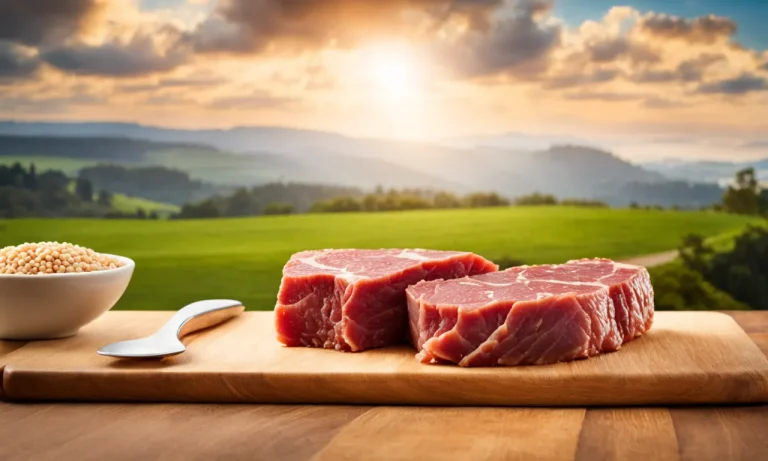Is Calcium Lactate Vegan? Examining The Source And Uses Of This Supplement
Calcium is an essential mineral for bone health and other important body functions. Many vegans turn to calcium supplements to ensure they are meeting their daily requirements. But is calcium lactate, one of the common forms of calcium found in supplements, actually vegan?
If you’re short on time, here’s a quick answer to your question: Calcium lactate is generally considered vegan, because the lactate used is a non-animal derived compound. However, it’s important to check supplement labels and manufacturing processes for any non-vegan additives.
In this nearly 3000 word article, we’ll take an in-depth look at calcium lactate, examining how it is produced, how it differs from dairy-derived calcium, its common uses, and how vegans can ensure they are getting sufficient calcium from plant-based food sources and supplements.
What Is Calcium Lactate?
Calcium lactate is a mineral salt compound that is commonly used as a dietary supplement. It is derived from lactic acid, which is naturally produced in the body during certain metabolic processes. Calcium lactate is also different from dairy lactose, which is a sugar found in milk and other dairy products.
A Mineral Salt Compound
Calcium lactate is formed by combining lactic acid with calcium carbonate. The resulting compound is a white, odorless powder that is highly soluble in water. This makes it easy for the body to absorb and utilize the calcium it provides.
Calcium is an essential mineral that plays a vital role in various bodily functions, including bone health, muscle contraction, and nerve transmission. Therefore, calcium lactate is often used as a dietary supplement to help meet the recommended daily intake of calcium.
Different From Lactic Acid and Dairy Lactose
It’s important to note that calcium lactate is not the same as lactic acid or dairy lactose. Lactic acid is a byproduct of anaerobic respiration in the body and is responsible for the burning sensation in muscles during intense exercise.
On the other hand, dairy lactose is a type of sugar found in milk and dairy products. While calcium lactate is derived from lactic acid, it does not contain the same properties or characteristics.
Calcium lactate is a vegan-friendly dietary supplement that can be obtained from plant-based sources. It is commonly used in the food industry as a food additive and is also available as a standalone supplement.
It is important to check the source and manufacturing process of calcium lactate supplements to ensure they are vegan-friendly and meet your dietary preferences.
How is Calcium Lactate Produced?
Calcium lactate is a type of calcium supplement that is commonly used to support bone health. It is produced through a specific manufacturing process that involves the conversion of lactic acid into calcium lactate. Let’s take a closer look at how this process works.
The Manufacturing Process
The production of calcium lactate starts with the fermentation of carbohydrates. This fermentation process is carried out by certain bacteria, such as Lactobacillus or Streptococcus species. These bacteria convert the carbohydrates into lactic acid through a process called lactate fermentation.
Once lactic acid is obtained, it undergoes a process called neutralization. During this step, lactic acid is combined with a calcium source, typically calcium carbonate or calcium hydroxide. This reaction results in the formation of calcium lactate.
The calcium lactate is then purified and processed further to obtain the desired form of the supplement, such as powder or capsules. The final product is then packaged and made available for consumption.
Plant-Based Sources of Lactic Acid
Lactic acid, which is a key component in the production of calcium lactate, can be derived from various sources, including both animal and plant-based materials. While animal-based sources, such as dairy products, have traditionally been used, there are also plant-based sources available.
Plant-based sources of lactic acid can include fermented foods like sauerkraut, kimchi, and pickles, as well as certain fruits and vegetables. These plant-based sources are often used in the production of calcium lactate supplements to cater to vegan and vegetarian consumers who prefer to avoid animal-derived ingredients.
No Dairy Ingredients Involved in Production
Contrary to what one might assume, calcium lactate does not contain any dairy ingredients. Although the term “lactate” may sound similar to lactose, which is a sugar found in milk, calcium lactate is actually dairy-free.
The production process of calcium lactate involves the conversion of lactic acid, which can be obtained from plant-based sources as mentioned earlier. Therefore, individuals with lactose intolerance or those following a vegan diet can safely consume calcium lactate without worrying about any dairy-related issues.
It’s important to note that calcium lactate supplements may vary in terms of their sources and production methods. It’s always a good idea to check the product label or contact the manufacturer directly if you have any specific dietary concerns or restrictions.
To learn more about the production of calcium lactate and its suitability for a vegan lifestyle, you can visit The Vegan Society or PETA for more information.
Uses of Calcium Lactate
As a Calcium Supplement
Calcium lactate is commonly used as a calcium supplement due to its high calcium content. It is derived from the combination of lactic acid and calcium carbonate. Calcium lactate is a highly bioavailable form of calcium, meaning that it is easily absorbed by the body.
This makes it an excellent option for individuals who need to increase their calcium intake, such as those with calcium deficiencies or those who follow a vegan diet.
According to the National Institutes of Health, adequate calcium intake is crucial for maintaining strong bones and teeth, as well as for proper muscle function and nerve transmission. Calcium lactate supplements can help individuals meet their daily calcium requirements and support overall health.
Food and Beverage Additive
In addition to its use as a calcium supplement, calcium lactate is also utilized as a food and beverage additive. It is commonly found in various processed foods, including dairy products, baked goods, and snacks.
Calcium lactate acts as a firming agent, helping to improve the texture and stability of these products.
Furthermore, calcium lactate is often added to beverages, such as sports drinks or fortified juices, to enhance their calcium content. This allows manufacturers to offer calcium-fortified options to consumers who may have increased calcium needs or prefer products with added nutritional value.
Pharmaceutical Applications
Calcium lactate is also used in the pharmaceutical industry for various applications. It can be found in over-the-counter antacid medications, as it helps to neutralize stomach acid and relieve symptoms of indigestion or heartburn.
Calcium lactate can also be used as a binder in the production of tablets or capsules, helping to hold the active ingredients together.
Additionally, calcium lactate may be used in the formulation of certain topical creams or ointments, where it can help to improve the absorption of other active ingredients into the skin. This makes it a valuable component in skincare and dermatological products.
How Vegans Can Ensure Supplements are Vegan-Friendly
Vegans strive to live a lifestyle that avoids the use of animal products, including in their dietary supplements. While many supplements are clearly labeled as vegan-friendly, others may require a closer look to determine their suitability.
Here are some tips for vegans to ensure their supplements are in line with their ethical and dietary choices.
Check Labels for Non-Vegan Ingredients
When browsing for supplements, it’s important for vegans to carefully examine the labels for any non-vegan ingredients. Some common non-vegan ingredients to watch out for include gelatin, which is derived from animal bones and tissues, and certain colorants like carmine, which is made from crushed insects.
Additionally, some supplements may contain hidden animal-derived ingredients, such as lactose or whey. By reading the labels thoroughly, vegans can avoid inadvertently consuming animal products.
Look for Third-Party Certifications
To ensure the vegan-friendliness of a supplement, it can be helpful to look for third-party certifications. These certifications are granted by independent organizations that verify a product’s compliance with specific standards, such as being free from animal ingredients and not being tested on animals.
Some well-known certifications include the Vegan Society’s Vegan Trademark and the Certified Vegan logo from Vegan Action. By choosing supplements with these certifications, vegans can have confidence in their ethical choices.
Contact Manufacturers About Sourcing and Processing
If a supplement doesn’t have a clear vegan label or certification, vegans can reach out to the manufacturers directly to inquire about the sourcing and processing of their products. Many companies are transparent about their ingredient suppliers and manufacturing processes and are happy to provide information to concerned consumers.
By contacting the manufacturers, vegans can gain insight into whether the supplement aligns with their values and make an informed decision about its vegan-friendliness.
It’s important for vegans to take the time to ensure that their supplements are vegan-friendly. By checking labels, looking for third-party certifications, and contacting manufacturers, vegans can confidently incorporate supplements into their daily routines while staying true to their ethical choices.
Vegan Food Sources of Calcium
When following a vegan diet, it’s important to ensure you are getting enough calcium to support your bone health. While many people associate calcium with dairy products, there are plenty of plant-based options that can provide this essential mineral. Here are some vegan food sources of calcium:
Leafy Greens
Leafy greens such as kale, broccoli, and spinach are excellent sources of calcium. In fact, these vegetables often contain more absorbable calcium per calorie than dairy products. For example, one cup of cooked kale provides about 94 milligrams of calcium, which is more than a cup of cow’s milk.
Incorporating these nutrient-packed greens into your meals can help you meet your calcium needs.
Tofu
Tofu, a popular soy-based protein, is also a good source of calcium. Calcium is often used as a coagulant in the tofu-making process, which results in a higher calcium content. A 100-gram serving of tofu can provide up to 350 milligrams of calcium.
Additionally, tofu is versatile and can be used in a variety of dishes, making it an easy way to increase your calcium intake.
Fortified Plant Milks
Many plant-based milks, such as almond, soy, and oat milk, are fortified with calcium to make them comparable to cow’s milk in terms of calcium content. Fortified plant milks can provide anywhere from 120 to 450 milligrams of calcium per cup, depending on the brand and variety.
These milks can be enjoyed on their own, added to smoothies, or used in cooking and baking.
Beans, Lentils, and Peas
Legumes like beans, lentils, and peas are not only a great source of plant-based protein but also contain calcium. For example, one cup of cooked black beans contains around 60 milligrams of calcium, while a cup of cooked lentils provides about 37 milligrams.
Adding these nutrient-dense legumes to your meals can contribute to your daily calcium intake.
Remember, it’s important to consume a variety of calcium-rich foods to ensure you are meeting your nutritional needs. If you have concerns about your calcium intake, consulting with a registered dietitian can provide personalized guidance and recommendations.
Conclusion
While its name may seem misleading, calcium lactate itself does not contain any animal products and is generally considered vegan. Vegans do need to ensure their supplements are free of other non-vegan additives through careful label reading and sourcing.
A vegan diet containing plenty of greens, tofu, beans and fortified plant milks can provide sufficient calcium without the need for supplementation. But when a calcium boost is desired, vegan-friendly calcium lactate is typically a good option.







